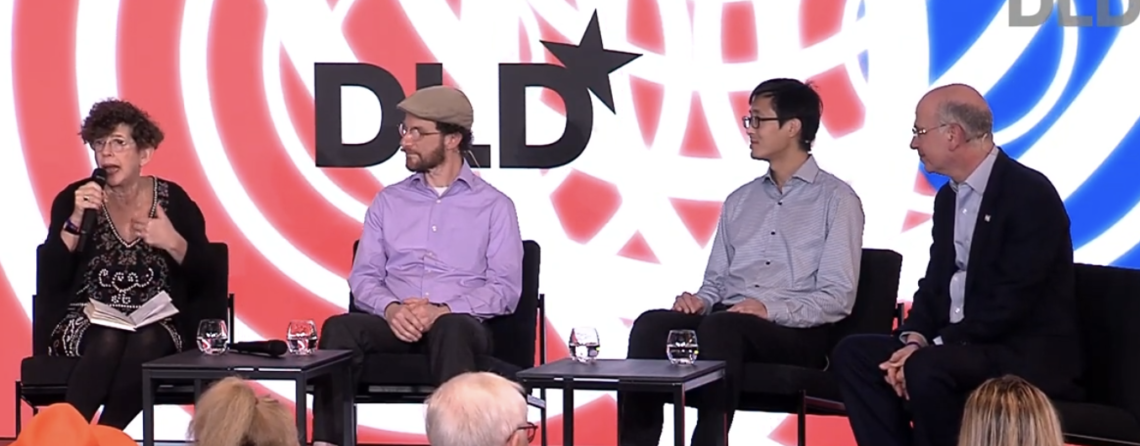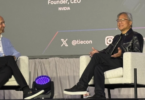AI got top billing this week at DLD 2024, an annual conference in Munich that gathers technology leaders, academics, philosophers, artists, and musicians to talk about what’s next. Many sessions focused on why 2024 will be an important year for AI, when real-world applications will start impacting almost every business in the world directly or indirectly. Read on to get some of the conference highlights:
AI and Business
Speaker Michael Chui, from the McKinsey Global Institute, talked about the huge productivity gains business can reap from AI. He said 75% of the value will come from four areas:
- Software development: Today every company is a software company, he said, and AI-powered software will offer up to 70% productivity gains.
- Marketing: By issuing a prompt executives can generate video and ad copy to power an entire advertising campaign.
- Customer Relations: AI-powered chatbots will serve as virtual subject matter experts.
- Research & Development: LLMs are not limited to language. Researchers will be able to enter a prompt and ask AI to find a drug candidate or design a car.
AI and The Media
Dow Jones’ CEO Almar Latour moderated a panel with Victor Riparbelli, the CEO and Co-Founder of Synthesia, an AI video generation platform. The company’s mission is to make video easy for anyone by utilizing AI. Latour noted that the company’s technology could increase the problem of deepfakes but Riparbelli said it could also serve as a boon to media by allowing consumers to choose formats other than text, allowing, for example, an 18-year-old TikTok user to consume Wall Street Journal stories on that platform.
AI and Religion
The Innovator’s Editor-in-Chief moderated a panel entitled “Will Chatbots Replace Rabbis?’ (see the photo).
Thanks to a new project called Virtual Havruta, soon people all over the world will have the option of turning to a chatbot with religious questions rather than simply asking their local rabbi. It’s the digital version of having a study buddy. Panelists included Antoine Leboyer, former board member of Geneva’s liberal synagogue and currently Managing Director of the Software and Artificial Intelligence Venture Lab at Munich’s Technical University; Lev Israel, Chief Product Officer at Sefaria, a non-profit organization that compiles an open source, digital library of Jewish texts and Paul Yu-Chun Chang, a senior AI Expert specializing in Foundation Models and Large Language Models at Germany’s appliedAI Initiative.
RAG technology will help ensure the info is relevant and the answers are not prescriptive: they are meant to expose people to different schools of thought (just like in the written Gemara) and encourage people to dig deeper to learn more, says Israel. We will still need human rabbis but for Torah to remain alive in the modern world it must be digital, it must be open and it must embrace all new means of communication, he said.
The project also achieves the almost impossible feat of bringing together the different branches of Judaism and serving as a sparring partner rather than just spitting out an answer like a search engine, outlining how each branch of Judaism would answer a particular question and then proposing relevant links for people who are interested in learning more and forming their own opinion.
This entrepreneurial project is worth examining for other reasons: It is serving as a test case for the application of domain-specific LLM-based Retrieval-Augmented generation or RAG technology. LLMs on their own are improv actors. There is a need to integrate them in a way that produces systems that we can trust.-RAG is one solution to the hallucination issues that are holding back GenAI. The technical gaps of RAG are being explored through this use case and promises to advance progress on making GenAI more reliable and usable by business. For more info on this non-profit venture go to https://www.sefaria.org/ways-to-give
AI: Regulation Vs Innovation
Tech industry representatives sparred with Eva Maydell, a member of the European Parliament, on how to get the balance right between AI innovation and regulation. Maydell spoke about the EU AU Act and how it aims to ensure that AI is safe, democratic, and aligned with European values. She explained that the EU is trying to take a light approach to regulating AI while ensuring that use cases with the highest risks have guardrails.
Jonas Andrulis, founder and CEO of German Generative AI startup Aleph Alpha, said it is a mistake to try and regulate foundational models. He added that the EU AU ACT will place an unfair burden on young innovative European AI companies because they will be forced to spend a lot of time on compliance rather than innovation.
In Europe and elsewhere there is concern over how U.S. tech giants broadly control the direction, speed, and nature of innovation in many, if not most, of the key technologies in the Internet tech stack. These existing concentrations of power, in combination with their emerging dominance in AI, give this same handful of corporations the ability to determine when, how, and in whose interests AI is developed and rolled out. Europe wants to create an alternative AI that reflects European values.
Andrulis’s company is trying to do just that. But Europe “won’t achieve digital sovereignty through regulation,” he said.
AI And What’s Next
When asked during a panel where AI will take us five years from now Google’s Ewa Duerr replied by saying “we need to think about the societal implications.” It is up to all of us to shape the industry and not let AI shape us, she said. “We need to ensure that it is not technology that defines our future,” she said, but instead think about how we want to live.
To access more of The Innovator’s Key Takeaway stories click here.







